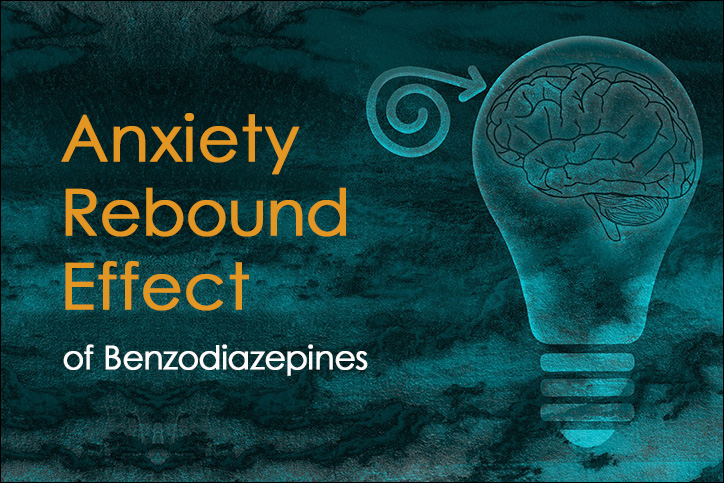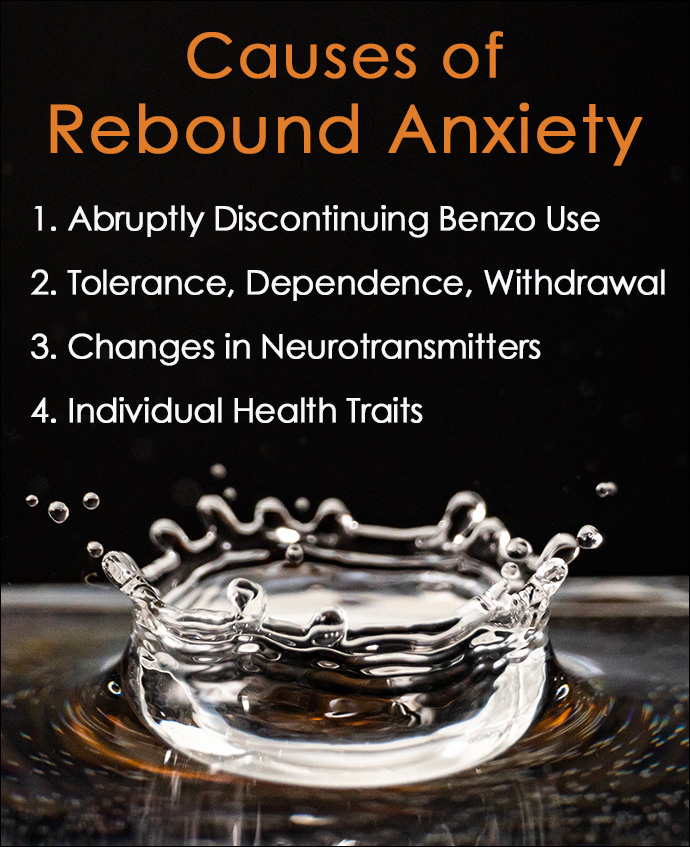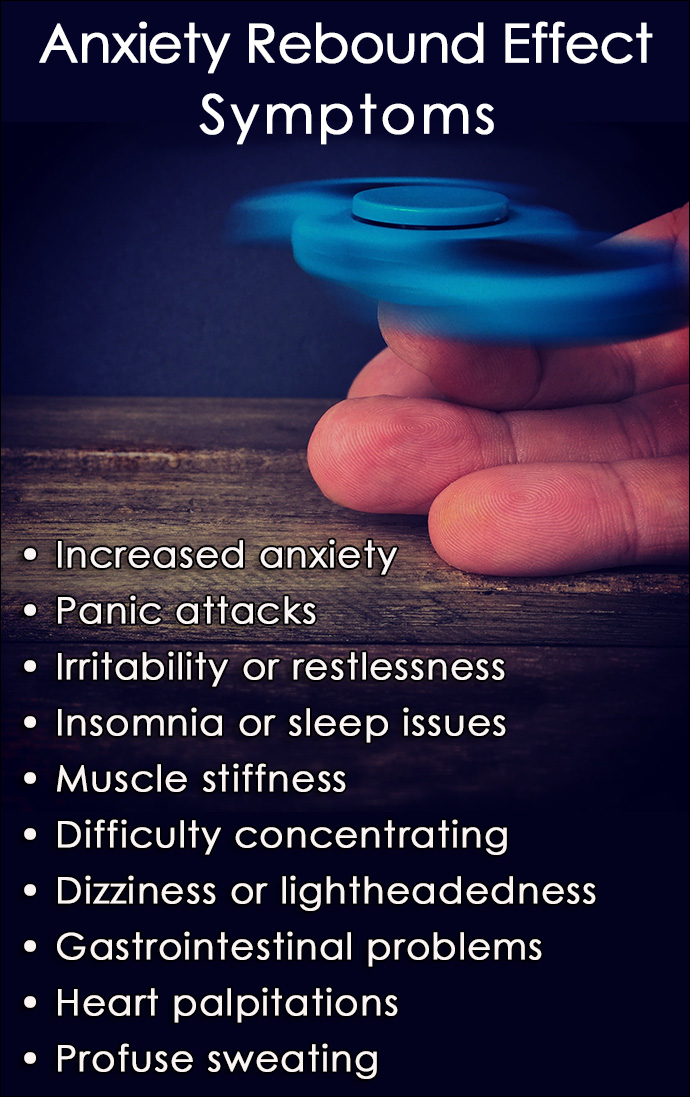Table of Contents
The anxiety rebound effect of benzodiazepines and other medications can be a cause for concern when treating certain types of mental health issues.
This condition is sometimes simply referred to as rebound anxiety and it can appear when attempting to stop using benzos after long-term use, and also while still taking the medication.
Statistics from the National Survey on Drug Use and Health shows that 30.6 million adults reported using benzodiazepines annually.
It’s ironic that medications like benzodiazepines that are prescribed for anxiety relief can also cause the same condition they are designed to treat, yet it is more common than many people realize.
For anyone taking benzodiazepines, it’s important to understand what causes the anxiety rebound effect, the symptoms, and effective treatment methods.
What is Rebound Anxiety?
Rebound anxiety is a paradoxical situation that arises when the symptoms a medication is prescribed to treat return more intensely after the medication is discontinued, or its effects wear off.
In the case of benzodiazepines, an individual may experience a rebound of anxiety that is more severe than the original symptoms they had before they began taking the medication.
The rebound effect of anxiety can also be more pronounced and difficult to manage than the original symptoms.
Key Points About Rebound Anxiety
- The anxiety rebound effect is characterized by the return of anxiety after taking a medication prescribed to treat the symptoms
- It often occurs when discontinuing or reducing the dosage of benzodiazepines
- The rebounding symptoms can be more severe than the original ones
How Benzodiazepines Reduce Anxiety
Benzodiazepines are a class of medications that enhance the effects of the gamma-aminobutyric acid (GABA) neurotransmitter in the brain.
GABA is an inhibitory neurotransmitter, which means it reduces the activity of nerve cells in the brain. GABA is known as the brain’s brakes, and it helps to calm or slow down excessive activity associated with anxiety and other mental health disorders.
Benzodiazepines bind to GABA receptors to enhance and modulate the neurotransmitter’s inhibitory actions.
GABA neurons inhibit the firing and overall excitability of other neurons in the brain that cause anxiety.
Benzodiazepines are often prescribed for their quick onset of action and effective relief of anxiety symptoms.
However, they also have a relatively short duration of action, which is why they are only intended for short-term use, due to a high risk of tolerance, dependence, and withdrawal symptoms.
Long-term or excessive use of benzodiazepines can lead to functional changes with the way GABA works in the brain. Taking them for a prolonged period of time causes GABA to be ineffective on its own without the use of the drug.
What Causes the Anxiety Rebound Effect?
Understanding the root causes of the anxiety rebound effect are crucial for developing treatment strategies to prevent and manage the symptoms.
While the condition is common with benzodiazepines, it can also occur with other medications too.
Main Causes of Rebound Anxiety
1. Abruptly Discontinuing the Use of Benzos
When a person abruptly stops taking benzodiazepines, it can trigger a rapid return of anxiety symptoms. The body struggles to regain GABA homeostasis after taking the drug and it causes an increase in anxiety.
2. Tolerance and Dependence
Long-term use of benzodiazepines often leads to the development of a tolerance to the drug and a physical dependence. As the body creates a tolerance, higher doses are needed to achieve the same therapeutic effect.
When the medication is reduced or discontinued, the body reacts with heightened anxiety due to a dependence to the drug.
3. Changes in Neurotransmitters
As mentioned, benzodiazepines act on the gamma-aminobutyric acid (GABA) receptors in the brain, enhancing the inhibitory effects of GABA.
Long-term use of benzos changes the natural function of the neurotransmitters, and without the drug, it contributes to the anxiety rebound effect.
4. Individual Health Traits
Each person’s brain chemistry responds to benzodiazepines in a unique way. Genetics, overall health, and the duration of benzodiazepine use can impact the severity of the rebound effect.
Some individuals may be more susceptible to the anxiety rebound effect than others.
Medications That Cause an Anxiety Rebound Effect
A rebound effect can be associated with a number of different types of medications and mental health conditions.
Sleep medications can cause rebound insomnia when stopped. Antidepressant medications can lead to rebound depression over time.
Benzodiazepines are the primary substances that cause an anxiety rebound effect, although certain types of benzos can be more likely to promote a return of anxiety due to their potency, duration of onset, and half-life.
Short-Acting Benzodiazepines
Short-acting benzodiazepines have a rapid onset of action and a short half-life, but they don’t last very long and quickly leave the body’s system.
Because of these characteristics, they are more likely to trigger a faster onset of withdrawal symptoms leading to the anxiety rebound effect.
Xanax (alprazolam) and Ativan (lorazepam) are two types of benzos with a short half-life.
An increase of anxiety is one of many known lorazepam side effects in addition to developing a tolerance and dependence to the drug.
High-Potency Benzodiazepines
Benzodiazepines with a high potency have a higher risk of more severe rebounding anxiety symptoms when a person stops taking them because they have a stronger or more sustained effect on GABA receptors.
Klonopin (clonazepam) and Valium (diazepam) are examples of high-potency or long half-life benzodiazepines.
Increased anxiety is one of the most common Valium side effects even though the medication is prescribed to treat anxiety disorders.
It’s important to note that all benzos can cause an anxiety rebound effect.
Frequent and long-term use increases the chances of developing a tolerance, addiction, and withdrawal symptoms that contribute to the risk of anxiety returning when reducing or quitting the use of the drugs.
Rebound Anxiety Symptoms
Rebound anxiety refers to a return or increase in the severity of symptoms that were being treated with medication. Many times it appears when the medication dosage is reduced or discontinued altogether.
The symptoms of rebound anxiety can vary in both severity and duration, and they frequently mirror the original anxiety symptoms, but for some individuals they may be more extreme.
Common Rebound Anxiety Symptoms Include:
- Increased anxiety
- Panic attacks
- Irritability or restlessness
- Insomnia or sleep issues
- Muscle stiffness
- Difficulty concentrating
- Dizziness or lightheadedness
- Gastrointestinal problems
- Heart palpitations
- Profuse sweating
Most people notice a return or increase in feelings of worry, nervousness, general anxiety, and sometimes panic attacks.
As soon as an individual experiences rebound anxiety they should contact their doctor or healthcare provider to begin a treatment plan to minimize the risk and severity of symptoms.
Rebound Anxiety Treatment
Effectively treating rebound anxiety usually involves several approaches.
Many times it’s necessary to begin with a benzodiazepine withdrawal and detox program to stabilize the symptoms.
An addiction and detox specialist will ensure the comfort and safety of the patient and gradually taper the dosage of benzodiazepines to overcome the withdrawal symptoms and rebalance the brain chemistry.
The most important aspect of treating the anxiety rebound effect is a gradual and supervised tapering of benzodiazepine medications.
Abruptly discontinuing benzodiazepines can be extremely dangerous and may cause serious health issues.
A healthcare provider will develop an individualized tapering plan based on the patient’s history, dosage, type of medication, and overall health.
After withdrawal and rebound anxiety symptoms have been stabilized and a tapering schedule has been outlined, psychotherapy can be beneficial for managing the psychological aspects of the anxiety rebound effect.
Cognitive Behavioral Therapy (CBT), Dialectical Behavior Therapy (DBT), and other forms of psychotherapy can be effective for managing the psychological aspects of rebounding anxiety.
Breathing and relaxation techniques, meditation, and practicing mindfulness are all beneficial for calming anxiety and should be incorporated during treatment.
All of these types of therapy help individuals develop coping mechanisms, identify triggers, and minimize the symptoms of anxiety.
In some cases, healthcare providers may utilize Medication Assisted Treatment (MAT) by prescribing other non-benzodiazepine medications with a lower risk of dependence to manage the symptoms of the rebound effect.
Adopting healthy lifestyle habits can improve the symptoms for individuals experiencing a rebound of anxiety.
Regular exercise, eating healthy foods, and getting proper sleep can have a positive impact on both physical and mental health, which in turn reduce anxiety.
Benzodiazepines can be effective for providing relief from anxiety and other mental health issues, but they are not without risks, especially when used incorrectly.
By understanding the causes, symptoms, and medications that pose a risk for rebound anxiety, individuals will be better prepared to avoid serious health issues.





